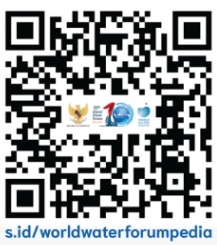Jakarta, May 4, 2024 - The Indonesian government will propose the implementation of a River Watershed (Daerah Aliran Sungai/DAS) spatial planning policy, namely Zero Delta Q, as a flood control measure as part of the thematic process of the 10th World Water Forum, which will be held in Nusa Dua, Bali, from May 18 to 25, 2024.
The Director General of Water Resources of the Ministry of Public Works and Public Housing (MPWH), Bob Arthur Lombogia, said that managing and mitigating disasters, especially floods in Indonesia, requires harmonization of human behavior towards the environment.
“The Zero Delta Q policy can be used in the policy process of the 10th World Water Forum as an issue that we need to implement. Recognising that there are still major challenges that need to be addressed now for the future, namely efforts to maintain surface runoff in a watershed due to changes in land use. The implementation of the Zero Delta Q policy must be applied to every land use activity in every watershed in order to maintain the function and lifespan of previously constructed infrastructure plans," Bob said in his statement in Jakarta recently.
Indonesian Government Regulation No. 13 of 2017 states that the Zero Delta Q policy refers to the requirement that any building must not cause increased water runoff into the drainage system or the river course system. This policy is set as a requirement for the granting of land use permits in a watershed. For example, in a building construction permit (Izin Mendirikan Bangunan/IMB) or other land use permits.
“The implementation of the Zero Delta Q policy cannot be done alone. We have to do it together because most of the implementation of this policy lies in the local government districts. We need the support of the central and regional government, including the use of land in a watershed for agriculture and other community activities," he said.
Bob further explained that a structural strategy is needed above all to deal with flood disasters, namely the management of water behavior to mitigate disasters, which includes the construction of water storage facilities such as reservoirs, retention basins, absorption wells and others. Structural measures can include increasing the river capacity and flow velocity, distributing the water flow in the catchment area, sedimentation protection and the construction of drainage systems as well as the prevention of seawater intrusions.
Concrete examples of the development of infrastructure for water management and flood disaster mitigation are the normalization of the Ciliwung River, retention basins in combination with dams in Cilincing and the Ancol Sentiong pump in the northern part of Jakarta.
As part of the MPWH water damage mitigation programs, flood control and beach safety infrastructures were constructed throughout Indonesia with a total length of 1,901 km and 423 boulders or sabo dams to control sediment and lava flows in the river channel.
Based on data from the World Risk Report 2023, Indonesia ranks second among the countries with the highest disaster risk with a World Risk Index (WRI) of 43.50. The World Risk Index (WRI) was assessed based on factors of exposure to disasters due to non climate-resilient infrastructures and vulnerability due to inadequate disaster risk reduction management.
Based on the National Agency for Disaster Countermeasure (Badan Nasional Penanggulan Banjir/BNPB) report, the number of flood events during the 2019-2021 period has increased, while since 2022 the number of incidents has significantly decreased amid the El Nina phenomenon which escalated the risks of heavy rainfalls. This could be considered as one indicator of the successful flood disaster mitigation efforts through structural strategies in the form of infrastructure development.
It is hoped that the 10th World Water Forum will become a platform for exchanging experiences and best practices regarding disaster risks management and reduction through three main processes, namely thematic, regional and political.

For more information and updates on the 10th World Water Forum please visit:https://s.id/worldwaterforumpedia